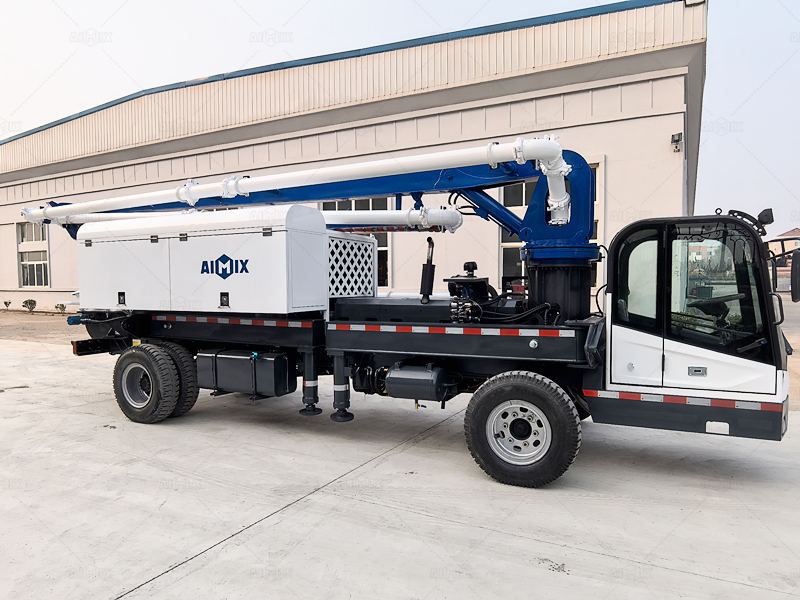How to Source Trailer Concrete Pumps from Local Distributors: A Complete Buyer's Guide
- aimixglobal5
- Mar 25, 2025
- 4 min read
Trailer-mounted concrete pumps represent one of the most versatile solutions for small to medium-scale construction projects, offering mobility and cost-effectiveness that truck-mounted systems can't match. Whether you're a contractor looking for a concrete pump for sale to expand your fleet or a project manager needing equipment for a specific job, sourcing from local distributors provides significant advantages including immediate availability, localized service support, and easier evaluation of physical units. This comprehensive guide walks through the entire process of finding and purchasing trailer concrete pumps from regional suppliers.

Benefits of Buying from Local Distributors
Immediate Access Advantages
1. Equipment Availability
On-site inspection of inventory
Faster delivery (typically 1-3 days vs. weeks for imports)
Ability to purchase demo or lightly used units
2. Localized Support
Proximity for service calls
Established parts inventory
Familiarity with regional conditions
3. Market Knowledge
Understanding of local regulations
Advice on suitable models for area projects
Connections to regional concrete suppliers
Identifying Reputable Local Distributors
Research Methods
1. Industry Directories
American Concrete Pumping Association members
Construction Equipment Association listings
State contractor board approved vendors
2. Online Platforms
Equipment Trader and Machinery Trader filters
Google Maps "concrete pump dealers near me" searches
LinkedIn construction equipment groups
3. Trade Networks
Recommendations from concrete suppliers
References from other contractors
Equipment rental company referrals
Verification Process
1. Business Credentials
Verify business license and physical address
Check Better Business Bureau rating
Review years in operation (10+ preferred)
2. Equipment Authenticity
Manufacturer authorization certificates
Serial number verification
Maintenance history documentation
Evaluating Available Trailer Pump Models
Key Specifications to Compare
1. Performance Metrics
Output capacity (typically 20-90 m³/h)
Maximum pressure (600-1500 psi)
Horizontal/vertical reach
2. Configuration Options
Diesel vs. electric power
Remote control availability
Pipeline diameter options
3. Local Adaptations
Cold weather packages
Dust protection systems
Corrosion-resistant components
Physical Inspection Checklist
1. Structural Components
Frame condition (no cracks or welds)
Outrigger functionality
Trailer hitch integrity
2. Mechanical Systems
Hydraulic leaks inspection
Engine hour meter verification
Pump cylinder wear measurement
3. Operational Testing
Dry run demonstration
Pressure gauge functionality
Control system responsiveness
Financing and Purchasing Options
Common Purchase Arrangements
1. Direct Purchase
Average price range: $50,000-$150,000
Payment terms: Typically 30% deposit
Delivery included within 100 miles
2. Lease-to-Own
24-60 month terms
10-15% buyout option
Included maintenance packages
3. Rental Conversion
Apply rental payments toward purchase
6-12 month trial period
Equipment refresh options
Financial Considerations
1. Total Cost Analysis
Fuel consumption rates
Expected maintenance costs
Resale value projections
2. Funding Resources
Equipment financing specialists
SBA loan programs
Dealer-sponsored financing
Negotiation Strategies with Distributors
Leveraging Market Position
1. Timing Advantages
End-of-quarter sales targets
Pre-inventory clearance events
Off-season discounts
2. Package Deals
Bundled with pipeline or accessories
Including training credits
Extended warranty offers
Key Negotiation Points
1. Price Flexibility
Typical 5-15% negotiable margin
Discounts for cash purchases
Trade-in allowances
2. Service Agreements
Free first service
Discounted labor rates
Priority response times
After-Sales Support Expectations
Standard Warranty Coverage
1. Component Protection
12-24 months on major components
6-12 months on wear parts
90 days on hydraulic hoses
2. Service Response
24-hour emergency support
48-hour standard service
Loaner equipment policies
Training Provisions
1. Operator Instruction
8-16 hour hands-on training
Safety protocol certification
Troubleshooting workshops
2. Maintenance Education
Daily checklist review
Fluid change procedures
Winterization steps
Local Regulatory Compliance
Regional Requirements
1. Transportation Regulations
Trailer lighting and brake laws
Overwidth permits (if applicable)
DOT inspection criteria
2. Jobsite Compliance
Noise level restrictions
Emission standards
Safety signage rules
Certification Needs
1. Equipment Documentation
CE or ANSI certification
EPA engine compliance
State-specific registrations
2. Operator Qualifications
ACPA training certification
OSHA safety training
Manufacturer operation courses
Comparing New vs. Used Equipment Options
New Equipment Advantages
1. Latest Technology
Improved fuel efficiency
Advanced control systems
Telematics integration
2. Warranty Coverage
Comprehensive protection
Included software updates
Factory support access
Used Equipment Benefits
1. Cost Savings
30-50% lower initial investment
Reduced depreciation
Faster ROI potential
2. Availability
Immediate shipment
Proven local performance history
Already adapted to regional conditions
Building Long-Term Distributor Relationships
Partnership Development
1. Volume Discounts
Multi-unit purchase agreements
Fleet refresh programs
Preferred customer status
2. Collaborative Planning
Equipment needs forecasting
Technology upgrade roadmaps
Training program development
Performance Tracking
1. Utilization Metrics
Uptime monitoring
Fuel efficiency tracking
Maintenance cost analysis
2. Feedback Loops
Regular service reviews
Equipment performance reports
Product improvement suggestions
Alternative Sourcing Options
Supplemental Channels
1. Auction Purchases
Bank-repossessed equipment
Contractor liquidation sales
Government surplus auctions
2. Rental Fleet Purchases
Well-maintained units
Complete service history
Recent refurbishment
Online Market Considerations
1. Verification Steps
Third-party inspections
Video walkthroughs
Payment escrow services
2. Logistics Planning
Transportation costs
Import duties (if applicable)
Local compliance modifications
Conclusion: Making an Informed Local Purchase
Finding the right trailer concrete pump for sale through local distributors requires careful research, thorough evaluation, and strategic negotiation. By following this comprehensive guide, buyers can:
1. Identify reputable regional suppliers
2. Properly assess equipment condition
3. Negotiate favorable purchase terms
4. Secure valuable after-sales support
The local distributor relationship often proves invaluable throughout the equipment lifecycle, providing ongoing support that maximizes uptime and productivity. For contractors seeking trailer-mounted concrete pumps, investing time in developing these local connections typically yields superior long-term results compared to distant or purely transactional purchases.
Remember to:
Visit multiple dealers for comparisons
Inspect units in person before purchasing
Verify service capabilities
Negotiate comprehensive support packages
With the right approach, sourcing from local distributors ensures you get equipment perfectly suited to your regional needs, backed by support that's just a phone call away.





Comments